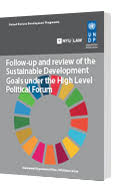Maanya Tandon, Paige Casaly, Tim McKenzie
The Outcome Document of the United Nations Summit for the Adoption of the Post-2015 Development Agenda, adopted by General Assembly Resolution A/Res/70/1 on September 25, 2015, emphasizes that “[g]overnments have the primary responsibility for follow-up and review, at the national, regional and global levels, in relation to the progress made in implementing the [Sustainable Development] Goals and targets over the coming 15 years.” States also agreed that, in order “to support accountability to … citizens,” they will provide for systematic follow-up and review at global, regional, and national levels. The High Level Political Forum (HLPF) that has been established under the auspices of the United Nations General Assembly and Economic and Social Council (ECOSOC) “will have the central role in overseeing follow-up and review at the global level.”
General Assembly Resolution 67/290 and the Outcome Document provide broad guiding principles for the HLPF’s structure, modalities and functions; however, the architecture for a coherent monitoring and review process has not yet been established. Building on the principles outlined in the Outcome Document that “follow up and review” processes must be built “on existing platforms and processes, where these exist, avoid duplication and respond to national circumstances, capacities, needs and priorities” and that “[d]ata and information from existing reporting mechanisms should be used where possible,” this report proposes two features — Review Facilitation Teams and an Informational Database — and a set of procedural recommendations for how these features may operate to ensure credible, evidence-based follow- up and review of the Sustainable Development Goals.
Read PDFRead PDF

